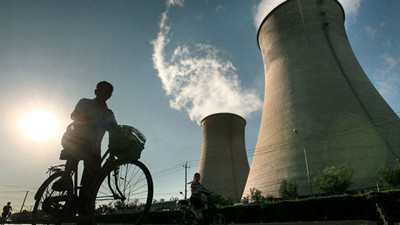China, India and climate change
中國,印度和氣候變化
Take the lead
引領(lǐng)全球
Emerging markets are a big part of the problem; they are essential to any solution
新興市場是問題的癥結(jié),也是任何解決方法的關(guān)鍵。
Greenprint: A New Approach to Cooperation on Climate Change. By Aaditya Mattoo and Arvind Subramanian.
綠色印記關(guān)于氣候變化的新合作方式作者:阿迪特亞馬圖,阿溫德蘇布拉曼尼恩
MOST books about the environment take the West as their starting point. This is understandable. For decades America was the world's biggest polluter, contributing more to the problem than any other country, whereas Europe—at least in its politicians' minds—has model environmental laws and holds plenty of righteous talks to negotiate new solutions.
很多關(guān)于環(huán)境的書都以西方為出發(fā)點。這個可以理解。過去幾十年來,美國都是世界上最大的污染源,造成的影響比其他任何國家都要大,而歐洲-至少在歐洲的政治家心里-擁有可作為典范的環(huán)保法律并在商討新的解決方法時發(fā)表了許多公證的講座。

But Europe and America are becoming supporting actors in the world's climate-change drama. The lead players are China and India. China is the world's largest emitter, contributing nearly a quarter of current global emissions. With India it accounted for 83% of the worldwide increase in carbon emissions in 2000-11. Though global warming began with industrialised countries it must end—if it is to end—through actions in developing ones. All the more reason to welcome “Greenprint”, the first book on climate change to concentrate on this growing part of the problem. Written by Aaditya Mattoo, an economist at the World Bank, and Arvind Subramanian, a senior fellow at the Centre for Global Development, the book offers an unflinching look at what one might realistically expect emerging markets to do.
但歐洲與美國,在世界正在上演的氣候變化戲劇的舞臺上正淪為配角。主要的演員是中國和印度。中國是世界上最大的廢氣排放國,它所排放的廢氣占了全球排放廢氣總量的將近四分之一。在2000年至11年期間,在全球碳排放增長中,中國和印度就占了83%。雖然全球變暖始于工業(yè)化國家,但必須終止-如果會終止的話-發(fā)展中國家采取行動終止全球變暖。《綠色印記》應(yīng)受到歡迎的更重要的原因是,它關(guān)注了發(fā)展中國家在全球變暖問題上日益凸顯的地位,這是第一本關(guān)注此問題的書。該書的兩位作者阿迪特亞馬圖是世界銀行的一名經(jīng)濟學(xué)家,阿溫德蘇布拉曼尼恩是全球發(fā)展中心的資深人士,本書毫不畏懼地指出關(guān)于我們可以期待新興市場采取何種切實的措施解決氣候變化的問題。
From an environmentalist's point of view, India and China elicit despair. They are obsessed with growth. To fuel it, they are building ever more coal-fired power stations, a filthy form of energy. Their cities fume. Their rivers catch fire. There is not much anyone can do about it.
從一個環(huán)保人士的角度看來,印度和中國的做法只能讓人絕望。他們太沉迷于經(jīng)濟增長了。為了推動經(jīng)濟增長,他們建了更多的火力發(fā)電廠-一種極不環(huán)保的能源。他們的城市都彌漫著煙霧。他們的河流都著火了。我們對此也無能為力。
But an attractive quality of this book is that it goes beyond such fatalism. The West, the authors argue, has failed to mitigate global warming, so developing countries will have to take over. This is necessary, they say, because global warming will affect developing countries more than rich ones, partly because tropical and subtropical lands are more sensitive to warming than cold or temperate ones, and partly because rich people can afford better flood controls and drought-resistant seeds than poor ones. One estimate by William Cline, an economist, found that a rise of 2.5% in global temperatures would cut agricultural productivity by 6% in America but by 38% in India. In light of their disproportionate vulnerability, emerging giants will have to push rich countries to make more environmental compromises. To make these demands credible, they themselves will have to make some changes too.
但本書最吸引人的地方在于它并沒有受制于宿命論。作者認為,西方國家未能減緩全球變暖,因此發(fā)展中國家要接過這個重任。他們說這是必要的,因為全球變暖對發(fā)展中國家的影響遠大于富裕國家,一部分原因在于熱帶和亞熱帶大陸比寒帶或溫帶大陸對溫度升高更為敏感,另一部分原因在與貧窮國家相比,富裕國家的人能買得起有更好的防洪抗旱能力的種子。一位叫威廉卡萊恩的經(jīng)濟學(xué)家預(yù)測發(fā)現(xiàn),全球溫度上升2.5%,美國的農(nóng)作物產(chǎn)量會降低6%,而印度的會降低38%。鑒于兩國對氣溫變化的承受能力相差如此懸殊,新興的巨頭將必須迫使富裕國家在環(huán)境問題上作出更多的妥協(xié)。為了表明這些要求合理,他們自身也要做出一些改變。
The trouble, as the authors admit, is that emissions cuts will also be costly for China and India. Messrs Mattoo and Subramanian estimate that if the two countries were to reduce emissions by 30% by 2020 (compared with doing nothing), their manufacturing output would fall by 6-7% and their manufactured exports by more than that. As still relatively poor countries, they are less able to bear the pain.
但麻煩在于,正如作者承認的,減少廢氣排放對中國和印度來說,代價也很高。馬圖先生和蘇布拉曼尼恩先生預(yù)測如果中印兩國在2020年前能把廢氣排放減低30%,那么他們的制造業(yè)產(chǎn)值將會降低6%-7%,而他們制造業(yè)出口降幅將更大。作為相對貧窮的國家,中印兩國無法承受那樣的代價。
These challenges help to explain why it is so difficult for India and China to take the lead on climate change. After considering different ways to allocate emissions cuts among nations, the authors concede that the fairest approach would be to allow developing countries to consume as much energy as rich ones did during their own industrial revolutions. But if the aim is to limit the rise in global temperatures to two degrees, which most scientists think necessary, this would allow developing-country emissions to rise by 200% whereas rich-country emissions would have to fall by an amount that is politically inconceivable.
這些挑戰(zhàn)也解釋了為什么印度和中國在氣候變化問題上不愿主動帶頭。該如何分配不同國家的減排任務(wù),經(jīng)過仔細考慮,作者也作出了讓步,他們認為最公平的方法就是允許發(fā)展中國家在進行工業(yè)化的過程中消耗的能源與富裕國家持平。但如果目標是把全球溫度上升控制在2攝氏度以內(nèi),這是多數(shù)的科學(xué)家認為必要的,那么發(fā)展中國家的排放量可上升200%而富裕國家的排放量則相應(yīng)降低,而這個降低的數(shù)量從政治的角度考慮是難以想象的。
The authors supply more reasonable solutions. They reckon that China and others could and should invest more in new technologies, such as carbon capture and storage, in order to boost improvements in clean energy. They also provide a detailed and convincing case for rich countries to put a price on carbon by introducing a modest border tax on imports from developing countries.
作者提供了更多合理的解決方法。他們認為中國和其他發(fā)展中國家應(yīng)投入更多的資金和資源于新技術(shù),像碳捕獲和碳儲存技術(shù),以促進清潔能源的發(fā)展。他們也提供了一個詳細的有信服力的案例,富裕國家通過對發(fā)展中國家的進口商品征收適當?shù)倪吘扯愐员銓μ紭藘r。
The book does not quite provide the promised “greenprint” for developing countries to reduce emissions. But that would be a tall order. As a first stab at analysing one of the world's most intractable problems, it provides a wealth of analysis and fuel for thought.
對于發(fā)展中國家降低碳排放,本書并未提供如標題所示的“綠色印記”。但那是一個過高的要求。本書首次深入世界上最棘手的問題之一,作了大量的分析,并為人們思考這個問題提供了動力。












